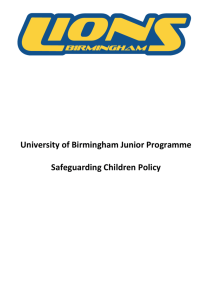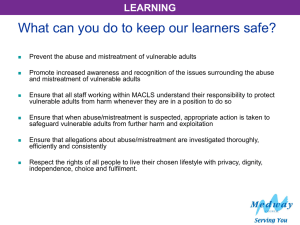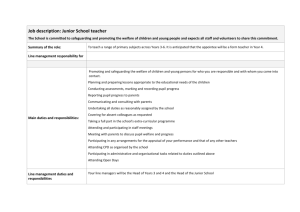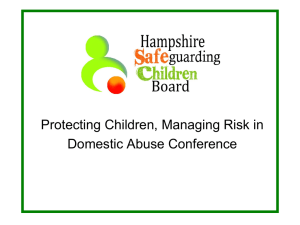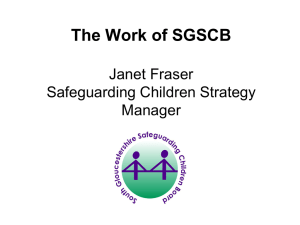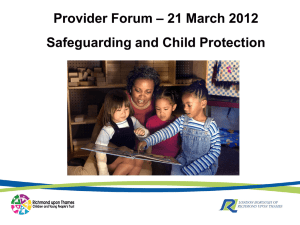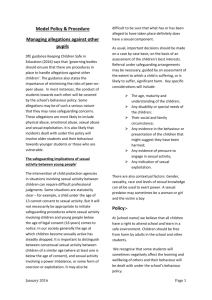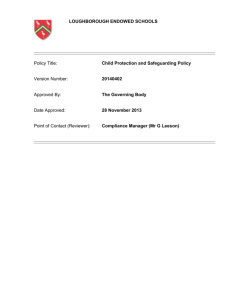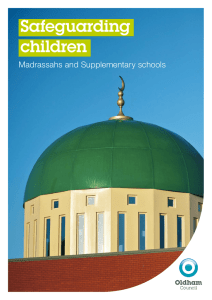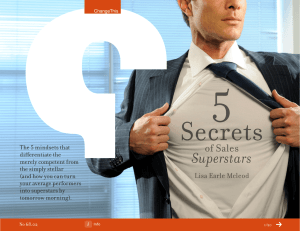Safeguarding & Promoting Children`s Welfare
advertisement
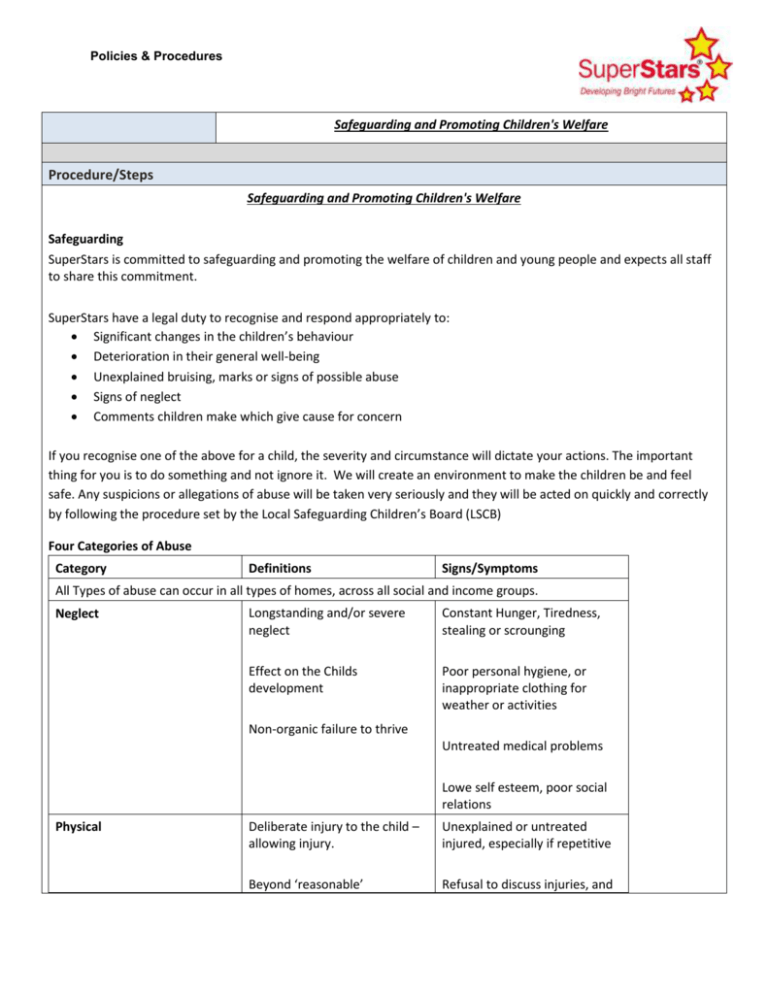
Policies & Procedures Safeguarding and Promoting Children's Welfare Procedure/Steps Safeguarding and Promoting Children's Welfare Safeguarding SuperStars is committed to safeguarding and promoting the welfare of children and young people and expects all staff to share this commitment. SuperStars have a legal duty to recognise and respond appropriately to: Significant changes in the children’s behaviour Deterioration in their general well-being Unexplained bruising, marks or signs of possible abuse Signs of neglect Comments children make which give cause for concern If you recognise one of the above for a child, the severity and circumstance will dictate your actions. The important thing for you is to do something and not ignore it. We will create an environment to make the children be and feel safe. Any suspicions or allegations of abuse will be taken very seriously and they will be acted on quickly and correctly by following the procedure set by the Local Safeguarding Children’s Board (LSCB) Four Categories of Abuse Category Definitions Signs/Symptoms All Types of abuse can occur in all types of homes, across all social and income groups. Neglect Longstanding and/or severe neglect Constant Hunger, Tiredness, stealing or scrounging Effect on the Childs development Poor personal hygiene, or inappropriate clothing for weather or activities Non-organic failure to thrive Untreated medical problems Lowe self esteem, poor social relations Physical Deliberate injury to the child – allowing injury. Unexplained or untreated injured, especially if repetitive Beyond ‘reasonable’ Refusal to discuss injuries, and Policies & Procedures chastisement untreated injuries Poisoning, inc. alcohol Shrinking from physical contact Withholding drugs or apparatus Fear of returning home, undressing, or medical help Both the use of an implement e.g. a belt or a physical strike that leave a mark are illegal Aggression or bullying Unexplained pattern of absences which may server to hide bruises or other physical injuries Sexual Sexual exploitation of any kind including watching others and viewing pornographic material Sexual awareness inappropriate to the child’s age, through drawings, games, vocabulary etc Frequent public masturbation Attempts to teach other children about sexual activity Aggressiveness, anger, anxiety, fearfulness This is a short summary, there are other signs, individual to certain children Emotional Must be persistent Must undermine the child’s sense of self worth Might reflect poor parenting skills Includes witnessing domestic violent of primary carer Continual self-depreciation, self-harm or mutilation Inappropriate response to painful situations Compulsive stealing/scrounging Air of detachment, social isolation or desperate attention seeking behaviour, depression or withdrawal. Eating problems, Policies & Procedures either overeating or a lack of appetite Dealing with Disclosure 1. Listen and stay calm. Do not condemn the abuser, do not judge, do not makes promises you can’t keep 2. Reassure them. Tell them that you believe them. Tell them that it happens to others and that they are brave to tell you. 3. Stay with them. If you can ‘ground’ them (“grounding” means to draw the child back to a more comfortable state of mind through things like normal conversation e.g. what activities have you done today, what’s your favourite TV program) 4. Accurately record the child works. Make it clear whether it is a fact, opinion or hearsay. 5. Report it to the Holiday Course Manger or head office; they will know the right procedure to follow. In some cases, they will speak to the parents first or report to the local safe guarding children’s board. 6. If a third party expresses concern that a child is being abused, we will encourage them to contact Social Care directly. If they will not do so, we will explain that the course is obliged to and the incident will be logged accordingly. If you have any concerns about a child’s welfare at your camp, do not keep it to yourself. Write it down and take advice. Only speak with your relevant manger or directly to the qualified designated persons for child protection at head office. Protecting yourself Part of safeguarding is also to protect yourself from allegations and to ensure your actions are not misinterpreted by anyone. Do this by observing the following: - Avoid being alone with a child Take a register of which children are with you for each session, noting the time of the session. If you take a child somewhere e.g. an empty room, do not enter with them, wait outside. If you have to enter the room, it’s vital you keep all doors open. Do not play-fight Children are not allowed to sit on your lap Challenge any child using ‘bad’ language Never let children touch themselves or others inappropriately in any form Never let a child’s allegation go unchallenged, unrecorded or not acted on Never do personal things for children that they are capable of doing themselves. Encourage children to help each other. Do not build ‘special’ relationships with individual children You must not, before, during or after your employment make or accept any contact with a child or a friend of a child you know through your work with SuperStars or through social networking websites. Any images of children taken on site must only be of those children whose parents allow photos to be taken. Policies & Procedures - Staff should not take any photos off site. Any images taken must be appropriate It is each individual staff’s personal responsibility to delete any images from cameras, phones and recording devices. Images must not be published elsewhere without the authorisation of the Holiday Course Manager. Whistle Blowing SuperStars will not accept or condone any behaviour by Staff or other adults associated with the Club that is contrary to our Aims and Objectives, Policies and Procedures. We will actively encourage and fully support the reporting of such behaviour. We will do this by: Promoting an environment of mutual respect, trust and open communication. Promoting an environment that is free from bullying, harassment and discrimination. Treating everyone equally and fairly, with dignity and respect and by valuing individual differences. Ensuring that the quality of the work of each staff member/volunteer is effectively monitored as well as the work of the club as a whole. Ensure that procedures are in place for reporting unacceptable behaviours/practices. Actively supporting staff/volunteers that ‘blow the whistle’ both during the investigation and after, and in line with the relevant legislation. Allegation against a professional If there is a serious allegation of abuse made against you, SuperStars will have to suspend you whilst the investigation is carried out. This is to protect all parties, including you. You should - Stay calm - Follow the manager’s instructions - Co-operate with questions and enquires - Seek advise – head office - Not confront the your accuser - Not speak with your ‘victim’ - Be supported through the process by a designated person at head office and/or your manager. SuperStars has a legal duty to inform the independent safeguarding authority of any suspicions of any allegations even if staffs leave before an investigation is started or completed. Good practice guidelines All personnel should be encouraged to demonstrate exemplary behaviour in order to promote children’s welfare and reduce the likelihood of allegations being made. The following are common sense examples of how to create a positive culture and climate. Good practice means: Always working in an open environment (e.g. avoiding private or unobserved situations and encouraging open communication with no secrets). Treating all young people/disabled adults equally, and with respect and dignity. Always putting the welfare of each young person first, before winning or achieving goals. Building balanced relationships based on mutual trust which empowers children to share in the decision- Policies & Procedures making process. Making activities fun, enjoyable and promoting fair play. Being an excellent role model - this includes not smoking or drinking alcohol in the company of young people. Giving enthusiastic and constructive feedback rather than negative criticism. Recognising the developmental needs and capacity of young people and disabled adults - avoiding excessive training or competition and not pushing them against their will. Keeping a written record of any injury that occurs, along with the details of any treatment given. Practices never to be sanctioned The following should never be sanctioned. You should never: Engage in rough, physical or sexually provocative games, including horseplay Allow or engage in any form of inappropriate touching Allow children to use inappropriate language unchallenged Make sexually suggestive comments to a child, even in fun Reduce a child to tears as a form of control Fail to act upon and record any allegations made by a child Do things of a personal nature for children or disabled adults, that they can do for themselves Incidents that must be reported/recorded If any of the following occur you should report this immediately to the Head Coach and/or Holiday Course Manager and record the incident. You should also ensure the parents of the child are informed: If you accidentally hurt a child If he/she seems distressed in any manner If a player misunderstands or misinterprets something you have done. Use of mobile phones and cameras Photographs will only be taken of children with their parents’ permission. Only the club camera will be used to take photographs of children at the Club, except with the express permission of the manager. Neither staff nor children may use their mobile phones to take photographs at the course. Toilet Supervision. Under 8’s – Staff should stand in the door way rather than in the cubicle area. Over 8’s – Staff should stand outside, remind child of good hygiene. If you are worried about sharing concerns about abuse with a senior colleague, you can contact social services or the police direct, or the NSPCC Helpline on 0808 800 5000, or Child line on 0800 1111. Responsibility(ies) Head Coach, SuperStars Staff, HC Manager
